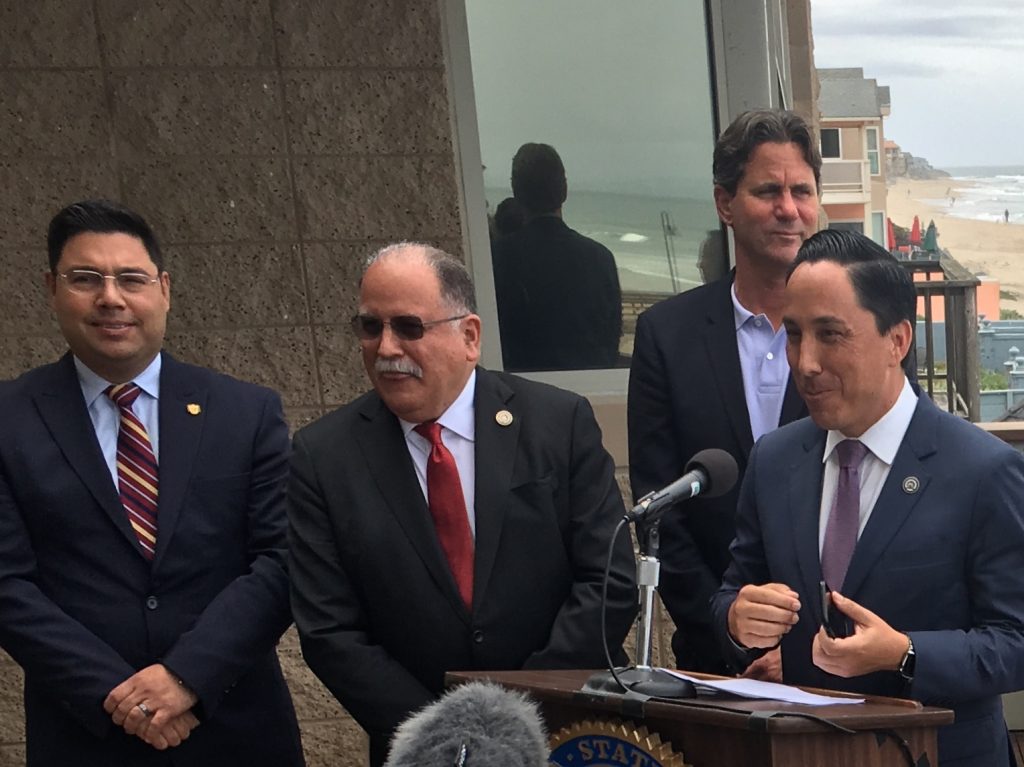
California Assembly Speaker Anthony Rendon and the bi-lateral members of the Assembly have initiated the California-Mexico Strategic Dialogue program. This multi-faceted program is designed to bring together various officials and legislators from California and Mexico in a substantive focused manner that will “hopefully lead to actual policy changes on both sides of the border – moving away from one-off visits and occasional trips by officials on both sides.”
The program’s initial focus is the cross-border pollution crisis in the Tijuana River Valley (TRV) Watershed, which is fortunate for Imperial Beach, Coronado and the rest of San Diego since toxic sewage and trash regularly flows from Tijuana through the Tijuana Slough to the Pacific Ocean. After decades of ever increasing toxic waste and trash flows, residents of Imperial Beach and Coronado are gratified that finally, in 2019, officials on both sides of the border are addressing this underfunded crisis head-on. In future years the California-Mexico Strategic Dialogue program plans to more thoroughly deal with other policy issues, such as health, employment, energy, immigration, and trade.
This first panel discussion, “Tijuana River Watershed,” took place at the Imperial Beach Lifeguard Headquarters conference room on Friday, April 5. California State Assemblyman Todd Gloria gave a welcome address explaining the purpose of the panel discussions. “Beaches are closed half the year, and there is some serious stuff in the river; human waste, industrial pesticides,” stated Assemblyman Gloria. He then introduced Assemblyman Jose Medina of CA 61st District. Medina sits on the Assembly Budget Committee, and the budgeting of tens of millions of dollars is needed to repair and construct infrastructure in the TRV. These Assemblymen will be instrumental in educating all of the California state legislature on the TRV border crisis.
Mayor Serge Dedina of Imperial Beach next spoke about specific “low cost and short term solutions to part of the TRV issue. The IBWC (International Boundary and Water Commission) is installing an earthen dam to help stop accidental sewage flows this summer.” Trash booms are to be placed on the Tijuana side of the border to block larger items such as tires, discarded appliances and electronic trash from flowing down the river into the ocean. Mayor Dedina also expressed the need for increased year-round water testing.
Attending from Tijuana, Councilman Manuel Francisco Rodriguez Monarrez addressed the need for prioritizing the environmental funding agenda in Mexico. He emphasized that the infrastructure and environmental laws already in place in Tijuana, “which are not very well applied,” need to be more strictly enforced by the Mexican government. Councilman Rodriguez Monarrez said $16 million has been requested from the Mexican Congress to improve the Punta Bandera sewage processing plant. He stressed that funds from the United States and California legislature are also necessary. A new sewage treatment plant is estimated to cost over $370 million.
Attending the Friday afternoon inaugural panel discussions from Coronado were Mayor Richard Bailey, Councilmen Mike Donovan, Marvin Heinz and Whitney Benzian. Mayor Bailey stated, “The panel discussion was encouraging. Assemblymember Gloria is an influential leader in Sacramento and can be a strong advocate on this issue. I trust he’ll push the state to be helpful in every way possible.”
David Gibson, Executive Officer of the San Diego Regional Water Quality Control Board of the California Environmental Protection Agency, was very helpful in explaining the lawsuit that they initiated in early spring of 2018. This lawsuit is against the IBWC and partners in the lawsuit are California Attorney General Xavier Becerra for the state, and the City of San Diego, which joined the litigation in February 2019. This lawsuit is different from the Surfrider and Imperial Beach initiated lawsuits.
Since the establishment of the United States Environmental Protection Agency in 1970, the EPA and its various regional offices have successfully sued the federal government in several states. With a 2019 federal budget of over $8 billion and a workforce of over 14,000, the EPA is a powerful agency. Gibson explained they usually prevail over their opponents. In recent years the EPA has won their suits against Volkswagen, the City of New York, mining in Montana, as well as toxic insecticide effects on endangered species in northern California.
As with aging infrastructure in California, Tijuana is also faced with 50 year old sewage pipes breaking. Gibson detailed a few of the major differences that exist between the two countries. If an aging sewer pipe breaks in a California city, mobile emergency pumps take over to “divert waste water and sewage to alternate connectors for treatment and disbursement”. In Tijuana they have the dual dilemma of being a city with old sewage lines, and they have added new communities but not built new infrastructure to support the burgeoning population. When a sewage pipe breaks there is no way to divert wastewater and sewage, so it spills onto streets and into the Tijuana River. Gibson’s agency is looking into a “Bi-National Good Neighbor” approach. This policy would allow San Diego agencies, with modern emergency pumping and repair equipment, to quickly go to the aid of our Baja neighbors to assist in diversion and repair.
Regional EPA Environmental Engineer Doug Linden gave more details as to time and funding issues. It will cost approximately $2 million to repair the collector that failed in Tijuana a few months ago. A permanent fix to that one collapsed collector will be close to $6 million. As with most government projects, time as well as funding is a big consideration. Diagnostic and repair decisions will take another month. Due to treaties and accords between Mexico and the United States, funding must be a one to one matching joint expense. The sewage treatment plant built at Punta Bandera in the early 1990s has been at capacity almost from its opening. A new plant is a necessity.
Trans-boundary toxic pollution, trash and raw sewage has plagued generations of Americans and Mexicans. Pressure continues to build for both countries to prioritize funding, build infrastructure and strictly enforce environmental and building codes.




